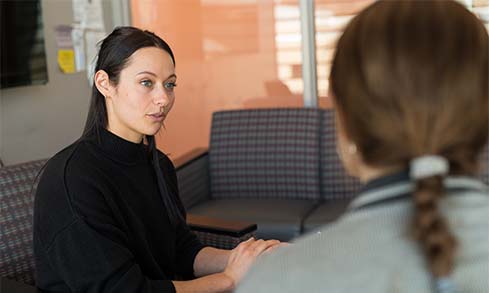Your Fairfield journey begins here. First-year applicants have opportunities for scholarships, financial aid, housing, and more.
First-Year Applicants

Application Requirements
The admission process at Fairfield University is holistic. Our belief in the importance of a thorough and careful review of all aspects of your application reflects our mission as a Jesuit institution. We seek to educate the whole person, and our admission practices reflect that goal.
Fairfield University recognizes the Common Application as its own application form, and submitting SAT/ACT test results is optional.
First-year students must submit applications and the following items by the admission deadline.
- Completed Common Application
- Official secondary school transcript
- Secondary School Report Form & Recommendation Form, submitted by your school/college counselor (accepted on or up to two weeks after the admission deadline)
- Personal statement (Common Application essay)
- $65 application fee or official fee waiver
- SAT or ACT results (If you choose to submit them. Refer to our Standardized Test Optional Policy below for details.)
- TOEFL, IELTS, or Duolingo are highly recommended if you have resided in the U.S. for fewer than three years and English is not your native language.
- Admission Interviews are not required, but they are a great way to demonstrate your interest in the University, as well as get any and all questions answered.
Your high school academic record is the most important part of your admission application. We look beyond your final grade point average and overall four-year record to consider your performance during each year in high school. We look at the level of challenge and the quality of the academic program you have pursued. We are also interested in the personal qualities, talents, and interests that you will bring to our campus community. We want to know about your extra-curricular involvement, the quality of your writing as reflected in the personal statement, and the reflections of teachers, counselors, and others who submit recommendations on your behalf.
In deciding whether or not to submit your standardized test scores, consider your overall academic record and whether you believe your scores accurately represent your academic abilities.
Take the Next Step
I like how Fairfield has a tight community where most people know each other."
- Jenna D. '25, English Major, Graphic Design Minor
Important Application Dates
| Stage | Early Action | Early Decision I | Early Decision II | Regular Decision | Transfer Students |
|---|---|---|---|---|---|
|
Application Due |
Nov 1 |
Nov 15 |
Jan 15 |
Jan 15 |
Fall–April 1 |
|
FAFSA & CSS Profile Due |
Dec 1 |
Dec 1 |
Jan 15 |
Jan 15 |
* |
|
Decision Notification |
Dec 20-Jan 15 |
Dec 15 |
Feb 15 |
April 1 |
* |
* Students who apply by this date receive priority consideration for admission, financial aid, merit scholarships, and housing. Transfer applications are accepted on a rolling basis after priority dates.
Application Types Explained
Students who consider Fairfield University to be among their top choices and would like to have their application reviewed early may submit their application under our Early Action program. Applicants for Early Action must submit the completed application by November 1.
Students who are certain that Fairfield University is their first choice for a college education and are willing to commit to attending if admitted are welcome to apply as Early Decision Candidates. Once admitted, an Early Decision candidate agrees to withdraw all other college applications and confirm his or her attendance at Fairfield. Early Decision I applications are due November 15.
Early Decision II applications are due January 15.
The Regular Decision application deadline is January 15.
The priority application deadline for entry into the fall semester is April 1. Students who apply by this date and have all supporting documents to our office, will receive priority review for admission, institutional financial aid, merit scholarships, and housing.
Changing Decision Options
If you wish to change from our non-binding Early Action or Regular Decision plans to the binding Early Decision option, please notify us by emailing admis@fairfield.edu. Be sure to download, complete, and submit the Early Decision agreement form by sending it to the same email address.
Please note that our deadline for decision plan change from Early Action to Early Decision I is December 1. Our deadline for deferred Early Action candidates or students who have applied and selected Regular Decision as their decision to change to Early Decision II is January 27.
Related Links
Questions About the Admission Process?
Find Your Admission CounselorBy the Numbers
98%
95%
5,300
-

Scholarships and Grants
Paying for college is easier with a variety of scholarships and grant opportunities.
-

Tours and Interviews
Learn more about Fairfield by visiting us in person or virtually for tours, interviews, and more.
-

Unsure What You'd Like to Study?
Learn more about the wide range of academic offerings across our 5 colleges.
Standardized Test Optional Policy
Fairfield does not require students to submit standardized tests as part of the application process.
When considering an applicant for admission, we consider all measures of academic achievement, as well as curricular and extracurricular achievement. We want to know about your academic abilities, community engagement, and leadership qualities. Your knowledge of and appreciation for Fairfield's mission and vision are also important factors. Ultimately, our goal is to enroll students who are committed to becoming scholars who will contribute to and benefit from the Fairfield community.
Have a question about our admission process or policy? Contact us directly by phone (203) 254-4100 or by email.
Admission Process FAQs
Fairfield University uses the Common Application as its only application.
The application deadline for Early Action consideration is November 1, for Early Decision I November 15, and for Early Decision II and Regular Decision January 15.
Yes. Students who are certain that Fairfield University is their first choice for a college education and are willing to commit to attending if admitted are welcome to apply as an Early Decision candidate. Once admitted, an Early Decision candidate agrees to withdraw all other college applications and confirm his or her attendance at Fairfield. The application deadline for Early Decision I is November 15 and for Early Decision II is January 15.
Students who consider Fairfield University to be among their top choices for their undergraduate education and who would like to have their application reviewed early may submit their application under our Early Action program. Applicants for Early Action must submit a completed application by November 1.
A competitive applicant has a solid A/A- average weighted GPA in a strong college preparatory program which includes some honors and/or advanced placement classes. The middle 50% of admitted students scored between 1300-1410 on the SAT, and between 27 and 31 on the ACT.
Fairfield also seeks to enroll students for whom Fairfield is a good fit. We appreciate when students have taken the time to get to know the campus through visit programs, tours, and time with our counseling staff. Students who take an active role in their admission process demonstrate that they have an interest in Fairfield and have taken the necessary steps to decide that we may be the right place to continue their academic journey.
Fairfield University received 21,290 applications for undergraduate admission for the Class of 2029. The admit rate for the Class of 2028 was 25%.
Test Optional Policy FAQs
Fairfield University evaluates prospective students using a holistic review process, looking at all aspects of a student’s record in making our admission assessment. This process reflects our educational mission as a Jesuit institution. We strongly believe in the education of the whole person and look for signs of academic and community engagement.
Based on our research, we know that a student's academic record in high school—including the strength of the curriculum and the student's performance in that curriculum—provides the best information about his/her potential academic success at Fairfield.
Our application review process for students who do not submit scores and those who do submit scores is very similar. We review all applications holistically. The most important aspect of any application is the student's academic record over four years in high school. We look carefully at the quality of the academic program the student has pursued, as well as their performance throughout high school. We also consider all of the subjective aspects of a student's application, including the personal statement, recommendations from teachers and counselors, and the student's interests and extracurricular activities.
Students who have chosen not to submit their scores must indicate on the Fairfield University Supplement to the Common Application that they have chosen that option.
Students should reflect on their standardized test scores and their overall academic performance in high school. If a student feels that the scores are an accurate reflection of their academic ability and potential and would like them to be considered by the admission committee as such, the scores should be included.
No. Students who do not submit their test scores will have the same opportunities for admission as those who do.
Yes. Students who have been homeschooled during high school are still required to submit their SAT or ACT results. International students whose English is not their native language must submit the results of the TOEFL (Test of English as a Foreign Language).
Yes. All applicants, regardless of whether or not they have submitted SAT or ACT results, will be eligible for merit scholarship consideration.
Financial Aid Process FAQs
Please visit the Office of Financial Aid page for details.
Yes. All admitted students are automatically considered for merit scholarships, regardless of whether they have completed an application for financial aid. To find out more about this scholarship opportunity, please visit our scholarships page.
Over 90% of the entering class received a merit scholarship, need-based financial aid, or a combination.
AP and College Credits FAQs
Fairfield University will award 3 or 4 credit hours for each AP course taken by a student, provided that the student has taken the Advanced Placement Test and obtained a test score of 4 or 5. A maximum of 15 AP credits will be awarded.
A formal review of AP coursework will occur after enrollment at the University, and how AP classes transfer may differ based on a student’s major choice.
Official score reports, transcripts, and related documentation should be sent to Pamela Kelly (if sending electronically, email asr@fairfield.edu), Academic Commons, DiMenna-Nyselius Library Complex, 1073 North Benson Road, Fairfield, CT 06824-5195.
Fairfield University recognizes the advanced nature of Higher Level International Baccalaureate courses and will award 3 or 4 credit hours provided a grade of 6 or 7 is achieved. A maximum of 15 IB credits will be awarded.
A formal review of IB coursework will occur after enrollment at the University, and how IB classes transfer may differ based on a student’s major choice.
Official score reports, transcripts, and related documentation should be sent to Pamela Kelly (if sending electronically, email asr@fairfield.edu), Academic Commons, DiMenna-Nyselius Library Complex, 1073 North Benson Road, Fairfield, CT 06824-5195.
For students who pursue college courses while in high school, upon receipt of an official college transcript, the course work will be evaluated by the appropriate academic administrator in consultation with the respective curriculum area, provided the following criteria are met:
- The course(s) must have been completed in a college environment and must have been taught by a college professor
- The course(s)/credits were not used to satisfy high school graduation requirements
- A final grade of “C” or better was earned.
College/school officials will determine the appropriateness of the transfer credit for the student’s program and decide whether it has met Fairfield’s curriculum standards. A maximum of 15 credits of approved coursework will be awarded transfer credit. The grades will not be transferred.
College-level courses will be evaluated upon receipt of the following documentation:
- An official letter from the high school principal or school counselor stating that the course was taught at the college level and did not count toward high school graduation requirements
- An official transcript from the college/university
- A course description and/or course syllabus
- High school profile outlining all high school graduation requirements
It is the discretion of college/school officials to determine if AP, IB, or transfer credit may be used to exempt students from specific University courses or requirements.
A formal review of dual enrollment coursework will occur after enrollment at the University, and how dual enrollment classes transfer may differ based on a student’s major choice.
Official score reports, transcripts, and related documentation should be sent to Pamela Kelly (if sending electronically, email asr@fairfield.edu), Academic Commons, DiMenna-Nyselius Library Complex, 1073 North Benson Road, Fairfield, CT 06824-5195.
General FAQs
Housing is required of incoming freshmen who reside outside of a radius (typically 30 miles) determined by the University. A portion of upperclassmen enter a lottery each year to take advantage of additional housing options at Fairfield Beach. Approximately 80% of all students live on campus in a traditional residence hall, suite-style residence hall, an apartment, or a townhouse.
